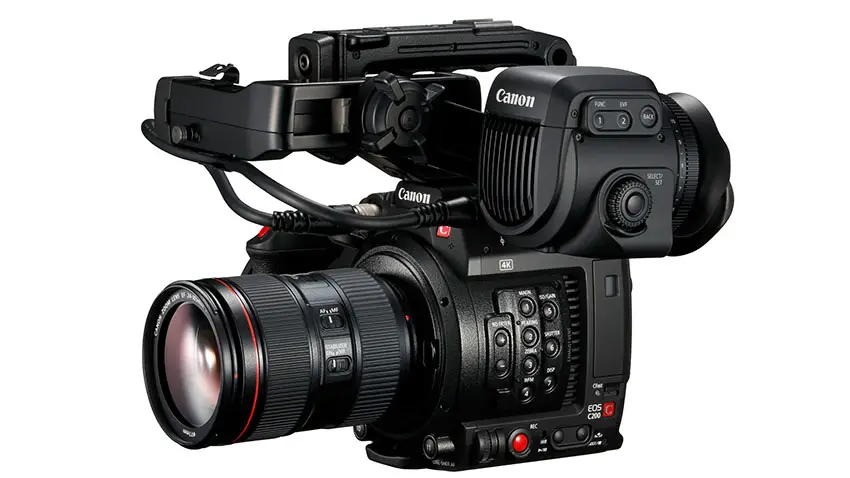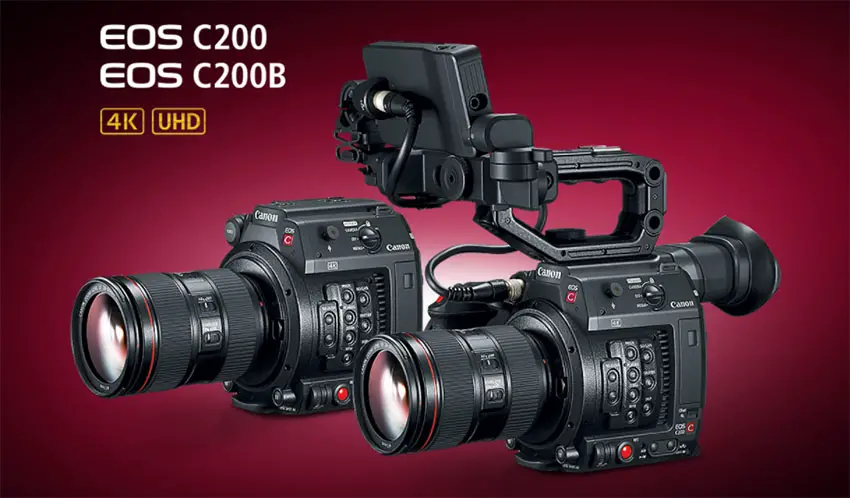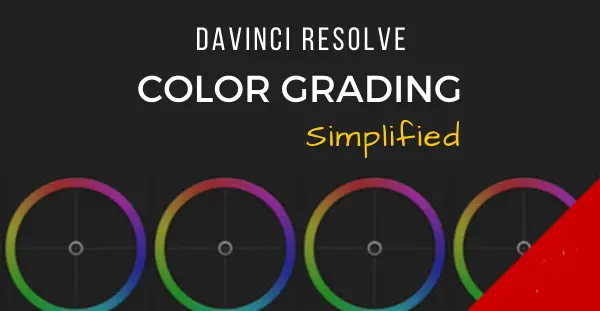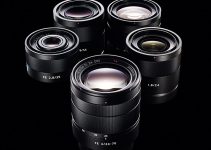In the early summer of this year, Canon introduced another enticing addition to their Cinema EOS camera lineup – the Canon EOS C200. When the product was first announced, videographers and filmmakers around the world were very excited that Canon has finally released a sub-$10K camera that has DCI-compliant 4K Raw shooting capabilities. While the initial hype was very prevalent in the filmmaking community, the minor disappointments and outcries progressively poured in when those who got their hands on the camera discovered one major flaw – the available codec support.

Upon release, Canon gave the C200 users three codec options: 8-bit MP4 and MP4 Proxy recorded to the dual SD-card slots at up to 3840 x 2160, as well as 10-bit/12-bit Cinema RAW Light recording onto C-Fast cards at the full resolution of 4096 x 2160. While the camera does allow for recording to Cinema RAW Light (at a rate of about 1 Gbps), the issue is that the file sizes are extremely large, which means that you will need plenty of cards for an entire day worth of shooting.
In the meantime, while the MP4 codec offered significantly lower file sizes and the video quality somehow seems to hold up surprisingly well in post, it still lacks the flexibility and efficiency of the more robust 10-bit 4:2:2 broadcast friendly codecs, especially when it comes to color grading. As an answer to the need for a codec with high-quality video and manageable file sizes, Canon has decided to release an MXF codec in early 2018, although now it seems that it won’t be exactly the update people have been demanding since the launch of the camera.

Despite the fact the MXF codec is supposed to act as the format in between MP4 and Cinema RAW Light, Canon has decided to make the codec only 8-bit 4:2:0, rather than 10-bit 4:2:2. According to News Shooter, the additional codec will be XF-AVC YCbCr 4:2:0 8bit and still will be recorded only to the SD cards. Obviously, there won’t be an option to record at a higher bit depth, besides the proprietary Cinema RAW Light.
Even though this purposeful limitation is entirely understandable from a business perspective considering that Canon are more or less protecting the sales of the C300 and C300 II siblings, it still disappoints in a way. The availability of a 10-bit codec on board would make the C200 much more flexible and versatile filmmaking tool but obviously, this is not the case, or at least for now.
[via: News Shooter]
B&H Order Links:
Canon EOS C200 EF Cinema Camera
Canon EOS C200B EF Cinema Camera (Body Only)
Disclaimer: As an Amazon Associate partner and participant in B&H and Adorama Affiliate programmes, we earn a small comission from each purchase made through the affiliate links listed above at no additional cost to you.
Claim your copy of DAVINCI RESOLVE - SIMPLIFIED COURSE. Get Instant Access!






Funny showing the C200 with their EVF which costs the same as the entire camera and a lens that costs less than a grand=) Interesting rig they got going there.
Was excited for this camera but I think I’m gonna go for the EVA1. We still need to see some footage from that camera, but it won’t take much. I hate Sony menus and am tired of Canon’s weird, wishy-washy treatment of their video line. They should have just put in a middle codec and made the C200 their flagship. Their current line is fragmented in a weird way and therefore rather frustrating for people that own the C300 or the C200. One has a broadcast ready codec but can’t overcrank without a crop. The other can overcrank without a crop but doesn’t have a broadcast ready codec. The cheaper camera can record raw internally but the more expensive camera can’t. It’s like they threw all the available features in a professional and consumer camera, mixed them all up in a pot, and then pulled them out at random and built a camera.
Don’t worry about this! I know ARM-chip coding like the back of my hand!
The DIGIC processors Canon uses in it’s cameras are all ARM-based which
means I can code a 4:2:2 OR 4:4:4 codec at 8, 10, 12, 14 and 16 bits
per colour channel using multiple user-set MP4/AVC/H.264/H.265-style
container formats AND I will GIVE IT AWAY FOR FREE !!!!
AND since I know BIOS chip engineering MUCH BETTER than Canon does,
I can piggy back the codec to be uploaded and hooked into the
on-board bios of almost ANY Canon camera!
I’ll see if I can have a version done by November of this year for the
above open source C100//C200/C300/1Dxmk2/5dmk4/6dmk2 codec.
That is something that would make me (and I imagine a lot of other people) very happy.
I’ve already got a motion JPEG-2000 (i.e. Wavelet-based) INTRA-FRAME codec running, which means that since AVC/MP4 are technically wavelet-like INTER-FRAME codecs, so i can put that into the container formats. I’ve got multiple
C-series and 1D/5D Canon cameras so I can test the
codec NOW by using BIOS hooks to see how it integrates
with the Canon BIOS chips …sort of what Magic Lantern
does….the CODEC is the EASY PART, it’s hooking into
the Canon BIOS that’s the hard part!
I now have some spare time to REALLY PUSH this product
AND YES I will ABSOLUTELY GIVE IT AWAY FOR FREE
open sourcing the code using the GNU GPL licence !!!
THAT SHOULD MAKE Y’ALL HAPPY !!!!!!
Please make it so. This 420 nonsense is the only thing that has me on the fence.
this would be so awesome! please keep us updated! Would be great to have this for the C100mki, too!!! Exciting!
anything for the C100 mark I perhaps?
Absolutely! My codec will be a generic MP4 container file format containing 16-bit (for cameras that support 16-bit DSP’s) 14-bit, 12 bit, 10 bit and 8-bit colour channels at 4:4:4, 4:2:2, 4:2:0 chroma sampling and even that old DV standby 4:1:1 colour space in MP4 containers (which you can do!) Canon uses the ARM core for all it’s newer DIGIC series camera processors, so my codec will work on 5D mk2/mk3/mk4, on 1Dx2, 1Dc, 7dmk2, C100, C200, C300, C500 and even the C700. It MIGHT even work on an M5/M6 and SOME of the PowerShot series if I use the appropriate cpu-specific cross-compiler…technically, with the right cross compiler, and bios hooks it will work on Panasonic, Sony, Fuji, etc cameras too since I use only highly-cpu-profiled C code. In case anyone is wondering, I have DECADES of video programming experience…I work on mission-critical systems such as 10-camera 4k surround-view 100,000 lbs+ UAV drones and their CODECS and flight control systems that grab video at up to 10,000 fps…SOOOOO….I kinda think I kinda know what I am doing on the programming side.
sounds sick,when do you have it
ready you think?
I’m HOPING to see if late December as a timeline
will work out…BUT….this IS programming however! It may be mid-January – I am not sure yet. The 4:4:4/4:2:2 with 16/14/12/10 bits MP4 codec itself isn’t all that hard to do ….it’s the wretched BIOS hooks and uploading into a Canon Camera that gets dicey. And since we only have the high end cameras, the powers that be at work tend to get downright nasty if I happen to accidentally brick a $40,000 C700 camera system or a bunch of 1Dc’s/1Dx’s/5Ds with an improperly coded camera BIOS test upload, so i kinda have to be careful.
I’m trying to make the code as DSP/CPU agnostic as possible so again, it SHOULD work on Canon, Sony, Fuji, Panasonic, Pentax, etc.cameras too!!!
Any news ?
See my update below! I am hoping for a working Canon 7D mk2 working test between January 15 to 30th, the rest of the Canon camera EOS line up form the 5D/1D/C100/C200/C300 up to the C700’s very soon after.
I very much look forward to hearing progress on this – I’m pretty sure I’m just about to buy a C200 but the 8 bit 4:2:0 thing has me thinking hard about the EVA-1. If you can pull this off it would be a major coup and you will be a hero.
I would be extremely on board to try this! let me know when the first release is out
Hey man. Any news on that custom codec? If you weren’t just blowing your horn and actually release a functional and practical solution, you might cause some serious stir in the community, much like when Magic Lantern announced RAW recording!
I have actually FINISHED the CODEC itself and I will shortly release the Windows Vista/7/8/10 Direct-X/DirectShow/Media Centre version of the codec for ANY compatible editing application so that you can EXPORT and IMPORT the camera video files properly into Adobe, FCP, Resolve, TMPEG, AVIdub, etc. And Apple OS and iOS codec will be released afterwards.
I am guessing AROUND January 15 to 20 for the Windows Codecs.
I am HOPING the 7Dmk2 version will be properly installed and tested by the January 30th. The BIOS hooks into the Canon Cameras are a ROYAL PAIN and have been utterly ANNOYING to get working!
I am testing this codec on an older Canon camera FIRST because our company Canon cameras range from $3000 to $40,000 systems and they would have an absolute FIT OF APOPLEXY if I bricked them with my software!
So first this i will test the Canon 7D Mark2, then the 6D mk1/2 then the 5D Mk3/4, then the C100 mk1/2, then the 1D X/X2, then the C200 and C300 Mk1/2 /C500 and finally the C700’s
So far… I should have the 7Dmk2 up and running between Jan 15 to 30 2018. Keep your fingers crossed!
where would we be able to find the release?
The release will be on GitHub, SourceForge, ZDnet, etc.
For NOW the Windows-specific Direct-X/MediaShow CODEC will be put there first (VERY SOON NOW!) and then it’s the Canon 7D Mark 2 version (which is test running NOW!) which will be released almost right afterwards. Then the 6D, 5D, 1D, C100/C200/C300 and on and on for the other cameras as I test and make sure I don’t brick those cameras with my software! Please NOTE it is still in ALPHA TESTING STAGE and not yet ready for Beta Version Release!
The 4:4:4 and 4:2:2 16/14/12/10/8 bits codec itself is done BUT the hooking into various Canon BIOSes HAS BEEN A NIGHTMARE !!!! Why does this SMALLEST part of the entire project have to be the most difficult to finish and test?! What IS with Canon making everything so difficult for the public?
Anyways….
Look for the search term:
“New 4:4:4 and 4:2:2 CODEC for Canon Cameras”
If you can truly achieve this with the C200, and implement it in a way that is stable and dependable, you will single handedly change the world of cinema. I imagine every person out there would purchase a C200 then.
***UPDATE***
I have seen some more of your answers below. I leave my old comment here, and I renew my offer to test it.
——————————–old comment——————————
Are you a member of the MagicLantern collective? Can you do better than a bunch of highly professional engineers paid way more than you? Are you going to make it STABLE and DEPENDABLE as the industry and the pressing clients require on a daily basis?
Yes, it is true, some of Canon choices may appear not easy to understand, and many geeks might not appreciate that. But, on the other hand, if you have a quarter of a million pounds production to set, would you rather rely on your genius or on a stable system?
On a serious note: if you really find the way of making it stable, dependable, affordable, well, let me know. I might be able to find you a job. And I would be happy to test the software, too.
OH YES!! One of the issues with the DIGIC-6 on the
C200 is to make sure EVERY instruction in my 444/422
MP4 codec is PROFILED to use the fewest instructions
possible eac operation. DMA-style copies of image data
back and forth between the CPU and Cache or RAM is
to BE AVOIDED and as much CPU register-based
processing done as possible. My technique to
ALLOW such fast processing is something I’ve
been doing as a teenager! DON’T USE single-precision
or even half-precision math! EMULATE real number
math using TWO integers separately as the integer
and fractional portion and clip to the integer bounds.
Since I do the compression on BLOCKS of 256 x 256
pixels I can keep my integer-based emulation of
real number pixel and sub-pixel movement math
to 16 bit values from 0.0 to 255.99 and
-127.99 to +127.99 The left-over extra
bit-wise values are used as error code
and skip-pixel semaphores!
This will INCREASE SPEED IMMENSELY so my
422/444 colour Wavelet-based compression code
CAN FIT and RUN FAAAST on a DIGIC-6 ARM-based
processor at up 4K 60 fps!